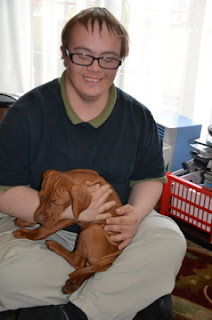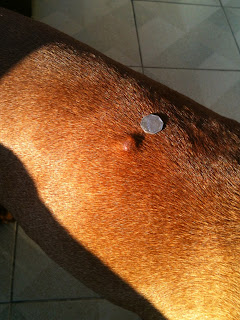| Paws with a cause |
Of course as someone who has done research before, I am always eager to promote another researcher's project. But this research study has a deeper significance for me. I have a sister-in-law who uses a beautiful yellow lab named Mia, as a service dog. She use to raise them as well for Paws with a Cause. In fact, we once thought of getting a service dog for our son, who has Down syndrome, but discovered he did very well with a pet. Service dogs encourage independence for people with disabilities. They are an essential means of moving about and accessing the world. I hope that you will participate in this research study if you have a service dog or know of someone who does.
Request for participation follows:
The research group at the School of Veterinary Medicine, University of California, Davis needs help from service/pet dog partners and their family members.
I am Mariko Yamamoto, working at University of California Davis, USA, as a postdoctoral fellow from Japan. I would like to let you know our research: "Role of dogs".
This study is to learn the outcomes of living with service dogs or pet dogs for their partners/owners and their family members.
We will compare the answers from service dog partners with the the answers from pet dog owners and non-dog owners.
Influences of service dogs and pet dogs for people living with disabilities and their family members, as compared with those who have no dog.
We would appreciate it if you could join and/or inform your friends about this web-based study.
Who can participate? (You have to be 18+ years of age)
- People who have disabilities other than visual or hearing disabilities
- Both service/pet dog owners and non-dog owners.
- Family members of service dog partners.
How to participate?
You can answer the survey from the following URL:
- For people with disabilities (http://www.surveymonkey.com/s/RQYZNHC)
- For caregivers of service dog partners (http://www.surveymonkey.com/s/RMQJ6PV)
The survey is voluntary and anonymous, and has been approved by the University of California Davis’ Institutional Review Board (IRB).
If you have any questions, please contact:
Mariko Yamamoto Ph.D (maryamamoto@ucdavis.edu)
The results of this research will be shared with the countries such as Japan where there are a few service dogs, to understand the broad benefits of service dogs for people with various disabilities and their families.
Thank you very much for your time,
Mariko
+++++ +++++++++++++++++++++
Mariko Yamamoto, Ph.D.,
University of California Davis
School of Veterinary Medicine
Population Health and Reproduction
TEL: 530-400-0770
++++++++++++++++++++++++++





